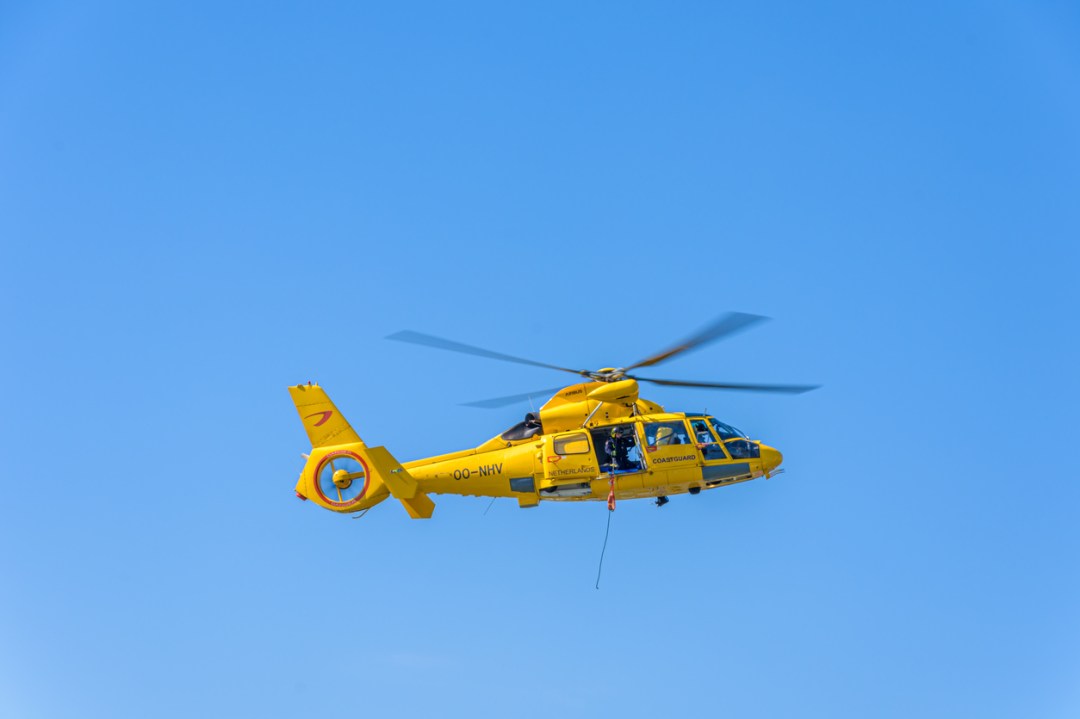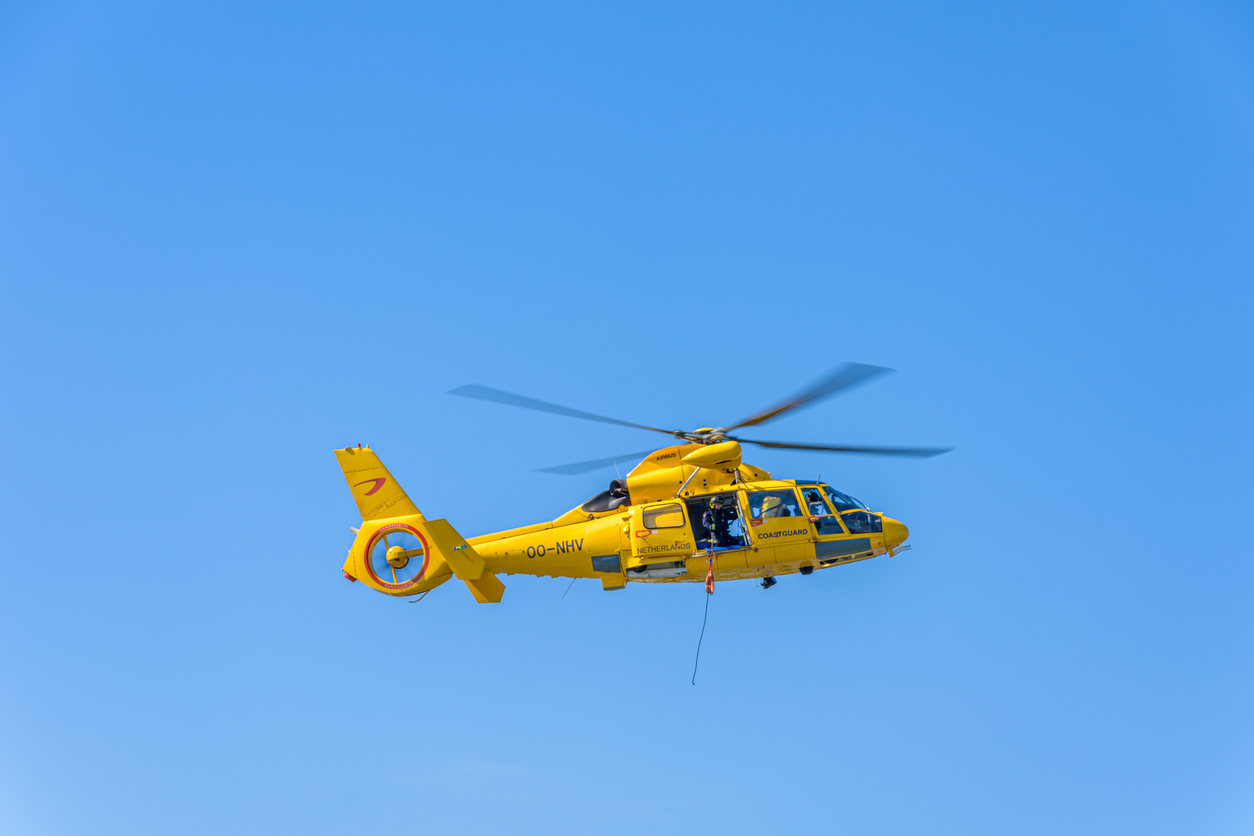My wife had already been given morphine and they had just topped her up with ketamine. She was now so high she didn’t seem even to know where she was. And this was probably a good thing, given she was strapped to a stretcher on the rear deck of a ferry in the Bay of Biscay, 100 miles off the French coast, and about to be hoisted some 75 feet into the night sky to a helicopter that was struggling in an increasingly stiff wind.
I asked her what the flight had been like. She said she had been so out of it she thought she was appearing in a remake of Apocalypse Now
The reason for all this drama was that she had abruptly dislocated her hip as we sailed from Portsmouth to Santander. Before I relate what happened next, though, some background. This wasn’t the first time this had happened. Sian had had a prosthetic right hip fitted in 2020, as a remedy for increasing arthritis, having been told this would be a minor procedure from which she would quickly recover. And indeed, initially, she did quickly recover and was soon back to being relatively active: walking, doing yoga, occasionally dancing even.
But then one day last September, while bending down to pick up the handbag she had just dropped, she somehow dislocated this prosthetic hip. I wrote about what followed here. Suffice to say things could have gone better. But after 48 hours in Pembury Hospital in Kent, she had had the prosthetic hip reattached – and was told it shouldn’t happen again. But it did. In the six months that followed, she would dislocate it twice more, each time agonising, each time requiring a trip by ambulance to A&E, and an emergency reattachment procedure under general anaesthetic, followed by a slow recuperation.
By spring, the frequency with which she was experiencing dislocations led her original surgeon to decide to give her a fresh prosthetic hip. She had surgery again in April, a new, new hip was installed, and, after 12 weeks of rest at home, she was given the all clear to resume an active life again – and to travel, hence our being on a boat to Spain. We were getting our lives back after her various health emergencies had forced us to cancel four different planned trips in the previous year. It had been a beautiful day. The sun had come out in the afternoon as we passed Brittany. We had spotted porpoises. By the time the sun was setting we had even seen fin whales.
But then it happened again. Sian was sitting on a sofa in the boat’s main lounge and just shifted her position – and she somehow disconnected her thigh from her hip. She was screaming, that now familiar sound. Her foot was at an unnatural angle to her body that made me feel queasy. A passenger sitting nearby alerted the ship staff and soon the medical officer was at our side. She was, thankfully, brisk and confident. She radioed the medical authorities in Spain and France for advice and was authorised to give the patient morphine. The screaming diminished. But then Sian started shaking uncontrollably, her eyes rolling back. ‘Stay with us!’ the officer implored. Surely she’s not going to actually die, I found myself thinking – we were sharing a pizza an hour ago, for goodness’ sake. She did stay with us. The eyes came back into focus and the shaking stopped. She had stabilised. Her return to consciousness was confirmed when she pointed out how the captain – who had now joined us – was hunky.
I assumed she would be stuck in this position all night until the boat reached Spain – but then came the suggestion of an air ambulance. The captain returned to the bridge and the ship altered course to meet the helicopter. Soon, it was with us: a swarm of guys in jumpsuits led by an action-woman doctor. She was barking orders to all – but very sympathetic with Sian. Then the ketamine came out. This would dull her senses further to allow her to be moved, they said. The doctor further explained that it was going to be easier to collect Sian by rope from the rear deck than to use the onboard helipad because there would be fewer stairs to jolt her. I could see the logic but Sian didn’t seem to be able to follow much now, which, in the circumstances, was for the best. Quite rapidly, we were on that deck, Sian on her stretcher, arms and legs strapped in place, surrounded by bustling, while I stood watching from a corner, incredulous. And then up she went, up and up on her rope, and into this whirring, roaring chopper above us with its flashing lights. The crew went up after her and the helicopter turned and shot off eastwards. Within minutes its lights had faded into darkness. I walked back into the ship, alone. Everyone had gone to bed.
I went to our cabin and tried to sleep. I managed this only fitfully. Then my alarm went, and I packed our bags and went out to drink coffee as soon as the kitchens opened – as much coffee as I could swallow. We docked in Santander at 8 a.m. on a Sunday morning. The city looked delightful. There were people out in small boats fishing and sailing. But I urgently needed to get out of Spain and to Bordeaux, 275 miles north, where she had apparently been flown. I drove without stopping, except at toll booths, arriving in Bordeaux four hours later, feeling slightly deranged from the strange night and the intense drive.
The Hôpital Robert Picqué is in a busy suburb a couple of miles outside Bordeaux city centre. It’s a military hospital, so the layout is like a barracks and it’s patrolled by armed guards. I had to produce a passport to get in. I found Sian, as directed, in Bâtiment D, Chambre 18. Since we’d parted, she had had the hip reattached, in theatre, within minutes of landing. She looked weak. She was weeping. I asked her what the flight had been like. She said she had been so out of it she thought she was appearing in a remake of Apocalypse Now.
My rough calculations suggested that it had been quicker from the moment of dislocation for her to get the 100 miles to hospital in France than it had been to get to the North Middlesex (4.3 miles away) or Barnet General (5.7 miles) with London Ambulance Service on the two occasions her leg had become dislocated at home. She had been treated more quickly too, by many hours. The next day came a fresh blow though: a CT scan that it had been hoped would give her the all clear to be discharged instead revealed that the prosthetic hip that they had fixed was itself broken. A part was floating free inside her – meaning this latest fix had no stability, could dislocate again at any moment, and almost certainly would if her position was significantly moved.
When they spelled out what we could do in this unforeseen situation, it came down to just two choices: either get her flown back to London and then taken by ambulance to A&E, or get surgery in situ in France. We hadn’t bought any travel insurance before the trip. The number of times she’d been to A&E had seen the cost we were quoted for the premium go up tenfold since just the year before and, because the consultant at University College Hospital had told her she was now OK and it should never happen again, we hadn’t thought we’d need anything beyond the basic UK Global Health Insurance card. Oh how we laughed at this thought process now.
No one in London was even returning her increasingly frantic calls to try to get her notes for the French doctors – never mind laying on a surgical team to greet her at Heathrow. So of the two choices that they had set out only one seemed remotely workable: surgery in Bordeaux. Despite the daunting expense, at that point, I would have remortgaged our house to avoid being flown back to try to get emergency treatment on the NHS. It would soon turn out though that thankfully we wouldn’t need to remortgage. The rather excellent British consul in Bordeaux took up our case and the amount we were looking at having to stump up for surgery in France quickly went down from the terrifying to the merely stomach-churning.
And so it was that Sian was once again given surgery on her hip – her seventh procedure on this joint in theatre, including six since last September alone. She was discharged six days later. Will her third hip replacement hold any better than the previous two? It remains to be seen. But everything about the French hospital experience was so much better than the British one that we at least have more hope that it may.
She never spent a moment on a trolley in a corridor in France. Everyone she dealt with knew who she was and had her notes to hand. Even with the language barrier, communication was vastly superior at every stage. The surgeon and the anaesthetist came by in person at least twice a day to update her, both before and after surgery; the hospital manager visited regularly too. The windows of her room opened onto natural light and birdsong. The food was so much better it was comical; there was fresh fruit. At night she could sleep because there was no unanswered phone ringing or machine endlessly bleeping. There was no distressed elderly patient next door screaming. If she pressed her buzzer, someone came immediately. There was no waiting around for hours after discharge for drugs or crutches – they were ready. All the days I had parked our car on hospital grounds for many hours were free.
Two weeks later, I was back in London driving her back to University College Hospital, just off the Euston Road, to get her first post-operative check-up. I knew our car was Ulez compliant but I wasn’t sure whether I had gone into the Congestion Charge zone – we seemed to be right on the edge of it but I couldn’t tell for sure on my phone. I may yet get a fine for this. It cost me £14 for two hours parking, the maximum allowed. But when she went to get her X-ray – without which the consultant wouldn’t see her – she was told the wait was three hours. We eventually managed to get it done in one. Then we went to see the consultant. We had been assured he would have read the case notes when we arrived. In fact, he hadn’t even seen them. When he did finally open them, he immediately said: ‘They’re in French’. He didn’t read French.
By this time, I was worrying about my parking expiring. Any longer and I would have had to choose between getting a £120 parking ticket and abandoning Sian to find her way back to me, hobbling on crutches. We made it with 90 seconds to spare. On the drive home, we stopped at our local drop-in hospital, Finchley Memorial, where she had been told she could have her stitches removed without an appointment. But on arrival, we found the wait for this would be, again, ‘about three hours’ – when the consultant had just expressly told her to avoid sitting in straight-backed chairs for more than a few minutes at a time. She rang our GP to seek guidance on what to do – and was number seven in the queue to be answered.
We were well and truly back in the NHS. I have absolutely no idea about how to run hospitals or any expertise on healthcare funding. All I know is that in our extensive first-hand experience – across many hours spent at five different hospitals or in or waiting for ambulances over 11 months – our healthcare system is dysfunctional. When you are treated somewhere where things work, you cannot help but notice the difference.
Following the operation, the French surgeon had returned to show us the parts of the prosthetic hip that he had replaced. These displayed abrasion marks which, he said, seemed to indicate that the prosthesis had broken some time before the dislocation occurred. The inference was that it could have happened at any point in a window of as much as several weeks. Knowing this, we have now come to be grateful that the dislocation happened at sea – rather than, say, in our home once again. Because our week in Bordeaux, and our strange way of getting there, was the best care we have had in this whole saga – by a hundred miles.








Comments